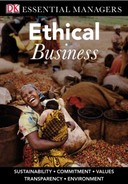Checking your Supply Chain
Your stakeholders and the media will judge your organization not only by your ethical standards, but also by the behavior of all the businesses that supply you with goods and services. You should make yourself fully aware of their practices and reputations because you may be held responsible for their actions.
Identifying weakness
No matter how hard you try to steer your organization along an ethical path, you are only as strong as the weakest link in your supply chain; and your exposure to this risk is enhanced if you operate in retail or if you own a brand with a high public profile. A recent example involved toy company Mattel, which outsourced around 50 percent of its production to manufacturers in China. The discovery of lead paint on some of its product lines led to the recall of almost one million units, and a significant loss of both money and reputation for Mattel, despite the fact that the company required its subcontractors to use paint provided by certified suppliers.

Assuring your suppliers’ ethical credentials
Do they provide resources to support the community in which they operate?
Do they make efforts to attract and retain a workforce that represents the varied background of the community within which they operate?
Do they promote the protection and preservation of the health of the natural environment?
Do they actively and demonstrably manage their ethical policies and business conduct?
Do they have accurate financial reporting and risk-management systems in place?
Do they work actively to minimize the occurrence of injury, danger, error, accident, harm, and loss?
Ensuring compliance
Developing and maintaining an ethical supply chain is no easy task: the standards you set for your suppliers must have teeth, but also be realistic, and they must work across cultural, language, and legal divides. Many companies have based their standards on independent principles, such as those set out by the International Labor Organization (ILO), but even having robust standards in place is no guarantee of compliance, simply because suppliers are more likely to conceal their lack of adherence to standards rather than risk losing their contract.
To obtain compliance, you need to work closely with all your suppliers. It is perfectly valid to select your supplier on purely commercial grounds, and then work with them to ensure compliance to your organization’s ethical standards. Use training and education to instill in them a real appreciation of the dangers of ethical misdeeds. Make sure that they have the capacity to fulfill your orders while maintaining ethical oversight, and try to involve local regulation agencies who can help the suppliers stick to standards. Examine the purchasing practices in your own organization and identify any conflicts that may exist between ethical and commercial objectives.
TIP
Before dealing with a new supplier, check if they allow trade unions to operate; a unionized workforce usually indicates respect for rights.
